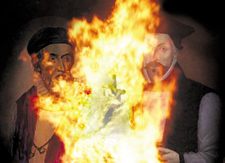It is 450 years since Hugh Latimer and Nicholas Ridley died. GORDON CHENG explains why they matter to us today.
On the 16th of October two English bishops, Hugh Latimer and Nicholas Ridley, were killed by being burnt at the stake near Oxford University. This atrocity was perpetrated 450 years ago, in 1555, on behalf of representatives of the Roman Catholic church, including the monarch of the time, Queen Mary.

Both Nicholas Ridley and Hugh Latimer faced their deaths with extraordinary courage, as Latimer's quote at the head of this article shows. Both men died in front of hundreds of witnesses, calling out confidently to God and praying that he would receive their spirits. This farewell letter from Ridley shows his attitude: "To die in the defence of Christ's Gospel, it is our bounden duty to Christ, and also to our neighbour" "Blessed are they, therefore, that die in the Lord;' and if they die in the Lord's cause, they are most happy of all. Let us not then fear death, which can do us no harm, otherwise than for a moment to make the flesh to smart; for that our faith, which is surely fastened and fixed unto the Word of God, telleth us that we shall be anon after death in peace, in the hands of God, in joy, in solace, and that from death we shall go straight unto life. Farewell, dear brethren, farewell! And let us comfort our hearts in all troubles, and in death, with the word of God."
The anniversary of their death by burning is relevant to Sydney Anglicans for at least two reasons.
Firstly, these men died for believing exactly what we believe. They believed that the authority of the church must come under the authority of Scripture. That is, that we are to be governed in our faith by the Bible alone. They denied the authority of the Pope, or any human or group of humans, to give a divinely binding interpretation.
They believed, because they trusted the Bible, that we are freely made right with God only through faith in the death of Jesus. Accordingly, they denied any contribution to our standing before God from our own good works, or from religious observance of the Mass, rituals, or any other church ceremony. For teaching this belief, and for denying the Roman Catholic alternative, they were killed (The official teaching of the Roman Catholic church on these issues remains unchanged).
Hugh Latimer said, "Christ with His death hath delivered us from the curse of the law. He hath set us at liberty, and promised that when we believe in Him we shall not perish, the law shall not condemn us. Therefore let us study to believe in Christ. Let us put all our hope, trust, and confidence only in Him. Let us patch Him with nothing, for, as I told you before, our merits are not able to deserve everlasting life" It is His doing only."
Secondly, the anniversary of their death has relevance because it tells us that Bible believing Protestantism has been part of the Anglican communion ever since the early days of the European Reformation, from the time that the writings of Protestant Reformer Martin Luther began to be smuggled into England in 1520. Indeed it's important for us to remember that these bishops and other martyrs (just under 300 in the space of four years) were burned because they were Protestant. Their Protestant beliefs were enshrined within the prayer books and the 39 Articles of Religion from the time of King Edward VI in the late 1540s and (except for this brief counterattack by Roman Catholicism under Queen Mary in the 1550s) they remained the official standard of doctrine for most of the Church of England worldwide for nearly 400 years. The original prayer book and the 39 Articles were composed by another Protestant Reformer Archbishop of Canterbury, Thomas Cranmer, who also was burned at the stake for his Protestantism the following year, March 21, 1556. Even today, the constitution of the Anglican Church of Australia uses the doctrine of the Book of Common Prayer and the 39 Articles as the required measure of what is taught within Anglican churches.
The anniversary of these deaths is a reminder to Sydney Anglicans of where we stand, and an example of how to trust Jesus to the very end.
The quotes in this article are taken from Five English Reformers by J.C. Ryle (Edinburgh: Banner of Truth, 1960, reprinted 1999), a book well worth reading.






















